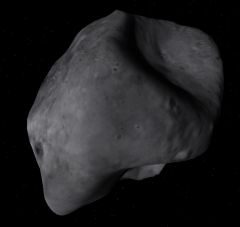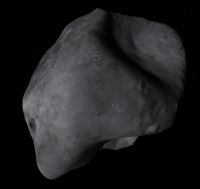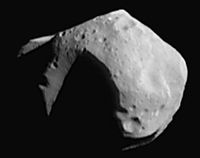Difference between revisions of "253 Mathilde"
Jump to navigation
Jump to search
(253 Mathilde.) |
m (Arvil moved page User:Arvil/Sandbox02 to 253 Mathilde: Move to article page.) |
(No difference)
| |
Revision as of 12:17, 11 September 2024
| 2 Pallas | |
|---|---|

| |
| 253 Mathilde from AsteroidPack_v1.00.zip in Orbiter 2002P3 | |
| Designation | |
| Name | 253 Mathilde |
| Reference body | Sun |
| Planetary mean orbits | |
| Epoch | 2006 |
| Semimajor axis (a) | 395933654604.709 m |
| Eccentricity (e) | 0.265943198619733 |
| Inclination (i) | 6.73846359° (0.117608376163224 radian) |
| Longitude of the ascending node (LAN, ☊) | 179.6424183° (3.13535167643231 radian) |
| Longitude of periapsis (ϖ) | 337.1297243° (5.88402369497666 radian) |
| Mean longitude (L) | 342.8855277° (5.98448141503376 radian) |
| Selected physical parameters | |
| Mean radius | 26400 km |
| Mass | 1.033×1017 kg |
| Rotation elements | |
| SidRotPeriod | 1503000 seconds (17.3958 days) |
| SidRotOffset | 0 |
| Obliqutiy | 0.1 |
| LAN | 0 |
| Note | *Elements given are from 253 Mathilde.cfg (AsteroidPack_v1.00.zip) |
253 Mathilde is a prograde asteroid that was discovered by Johann Palisa in November 1885. Mathilde was visited by the NEAR Shoemaker spacecraft in June 1997. Mathilde was named for the wife of the vice director of the Paris Observatory.
253 Mathilde in Orbiter
253 Mathilde was first introduced with the release of AsteroidPack_v1.00.zip in November 2004. Note that the landing surface as given in the config file is spherical, but the visual of Juno is not, if you land, you will likely be above or below the visual surface.
| Add-on | Source | Version | Author | Type | Release Date | Compatibility | Wiki article |
|---|---|---|---|---|---|---|---|
| Asteroid Pack 1.00 | O-F Resources | 2004-11-21 | Nighthawke | Scenery | 21 November 2004 | ||
See also
Gallery
Image of 253 Mathilde from the NEAR Shoemaker spacecraft in 1997 Animation of the flyby of NEAR Shoemaker spacecraft as it passed Mathilde
| edit The Solar System | |
|---|---|
| Central star |
Sun (Sol) |
| Planets |
Mercury - Venus - Earth - Mars - Jupiter - Saturn - Uranus - Neptune |
| Natural satellites |
Moon - Phobos - Deimos - Io - Europa - Ganymede - Titan - more... |
| Add-ons |
Planets - Dwarf Planets - Small objects - Natural satellites - Alternative star systems |


